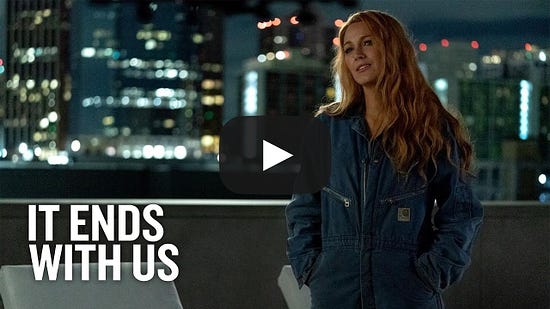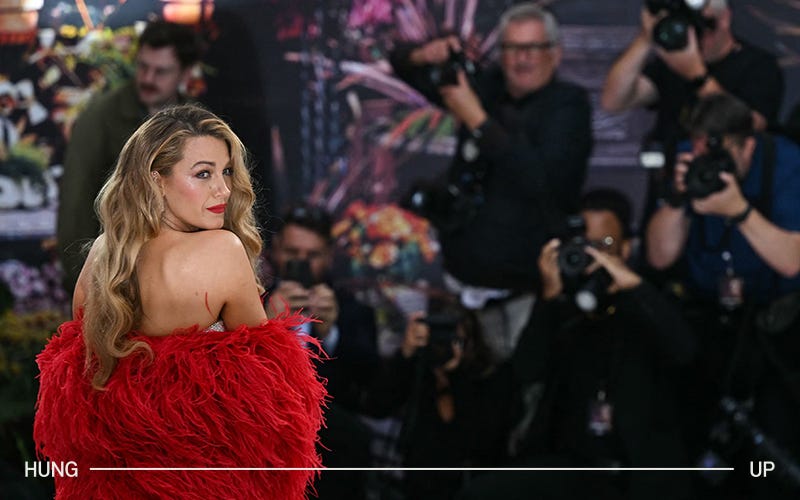Thank you for being a free subscriber to Hung Up! But wait … don’t you kinda want more of it … here’s a preview of what you’re missing behind the paywall: If you had to name five Blake Lively movies, could you? I have long wondered why Lively is the most famous actress who seems to rarely work. She was the breakout star of Gossip Girl, but try rounding out a list. The Sisterhood of the Traveling Pants, yes. And then … The Town? The movie where she wore a pinstripe suit? (I’m trying to describe A Simple Favor as someone who loved that movie.) The shark attack movie where everyone rooted for the shark? When Lively sells her new movie It Ends With Us, a novel about romance and domestic violence by Colleen Hoover, she’s not calling you back to a movie theater to witness a transformative performance. She’s selling haircare and floral dresses and “the multitudes women hold.” As what seems like an afterthought, cowing to pressure, she has shared statistics about intimate partner violence. This is her first live-action movie in 4 years, and it was always going to overperform box office expectations, no matter what her pitch was. The Venn diagram of white women who adore Blake Lively and the white women who read Colleen Hoover might actually be a circle. If It Ends With Us is indeed a girls night movie, as Lively is selling it, I would be interested to meet those girls. (They are all the meanest women you went to high school with, and they all work for TSA.) It is not a particularly deep story of overcoming abuse, either. It’s Alice Doesn’t Live Here Anymore by way of a “Live Laugh Love” sign, Enough powered by 50 Shades of Grey (the ogling of ritzy interiors, the designer treats, the ‘complicated rich guy’ of it all). The abuse plotline juices the love triangle: Lily Bloom (Lively) is happily dating her neurosurgeon boyfriend Ryle (Justin Baldoni) when she runs into her high school ex Atlas (Brandon Sklenar — imagine Garrett Hedlund if he asked if you’ve accepted Jesus Christ as your lord and savior). Ryle gets jealous and starts pushing Lily into walls and down flights of stairs. I read somewhere that Lively thought this would be her serious movie-awards contender. I can see why, it has all the benchmarks: tenacious wisecracking white woman, ambitious and fierce, but just offbeat enough to be vulnerable to love. (Erin Brockovich gets twisted and diluted into The Blind Side, which gets twisted and diluted into this.) Lily speaks in either weird nonsequiturs or unsexy deadpans, like the YA novel I tried writing when I was 14. The night she and Ryle meet she asks for his “naked truths;” when she’s embraced by a man she’s about to leave she smiles “I love you too, that’s the problem.”  But the problem is that Lively just isn’t very good in it. She has engineered her career to this material — flatly white feminist, romantic montages, that heavy sigh she’s done since her days playing Serena Van Der Woodsen — but for some reason, she doesn’t meet it. She’s Blake Lively in every scene, and Lily Bloom in about four of them. Lively doesn’t (or can’t) play insecure, self-conscious, or conflicted. (It doesn’t help that all the romantic scenes are played in Roseate, and all the scenes of conflict or abuse with quick cuts, with little time given to their emotional toll. Lily is only entitled to consider Ryle’s abuse on camera when Atlas is there to be a shoulder to cry on.) Lily isn’t charming, but you’re supposed to appreciate her ballsy, know-it-all deadpans and maybe even find them funny. She brings a date to dinner with her mother and introduces him curtly as “the guy I’m sleeping with.” That humor didn’t work for me, but maybe it works for someone else — after all, that’s the tone that has powered Ryan Reynold’s entire career. ... Keep reading with a 7-day free trialSubscribe to Hung Up to keep reading this post and get 7 days of free access to the full post archives. A subscription gets you:
|

